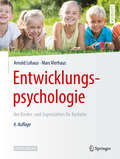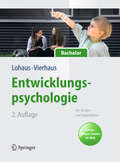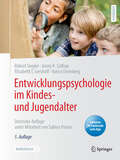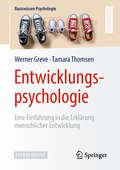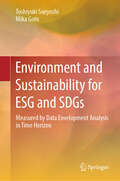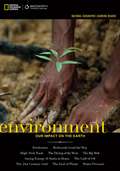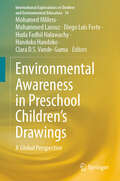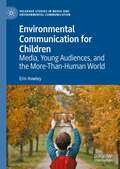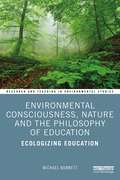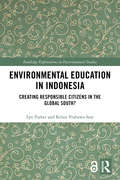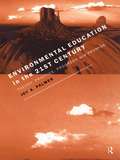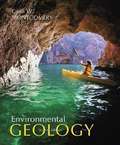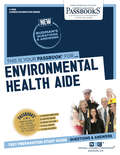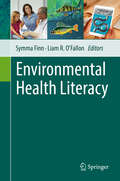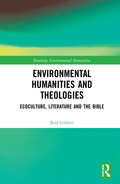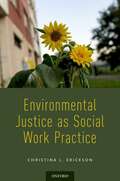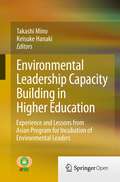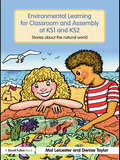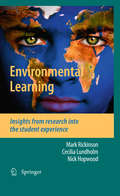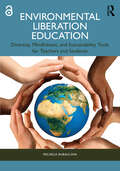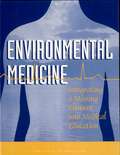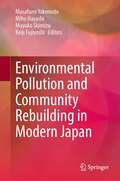- Table View
- List View
Entwicklungspsychologie des Kindes- und Jugendalters für Bachelor (Springer-Lehrbuch)
by Arnold Lohaus Marc VierhausDieses Lehrbuch vermittelt alles, was man für die Prüfungen im Fach Entwicklungspsychologie des Kindes- und Jugendalters wissen muss – so ausführlich wie nötig, so kompakt wie möglich und alles sehr verständlich. Eine Randspalte fasst die wichtigsten Fakten für Schnelllerner und zur Wiederholung zusammen. Eine prall gefüllte Begleitwebsite auf lehrbuch-psychologie.springer.com bietet Materialien zur Wissensüberprüfung, anschauliche Videos, Hörbeiträge und Foliensätze für die Lehre. Da ist alles drin!
Entwicklungspsychologie des Kindes- und Jugendalters für Bachelor: Lesen, Hören, Lernen im Web (Lehrbuch mit Online-Materialien) (Springer-Lehrbuch)
by Arnold Lohaus Marc VierhausDer Mensch entwickelt sich vor allem in früher Kindheit und Jugendalter rapide. Doch wann entwickelt sich was – und wie entwickelt es sich genau? Wie misst man Veränderungen oder den Entwicklungsstand? Welche Rolle spielen Erbgut und Umwelt? Dieses Lehrbuch beantwortet alle prüfungsrelevanten Fragen des psychologischen Grundlagenfachs "Entwicklungspsychologie", behandelt die zentralen Bereiche Motorik, Sensorik, Kognition, Intelligenz, Emotion, Sprache, Selbstkonzept, Moral, Eltern-Kind-Beziehung und gibt einen Überblick über entwicklungspsychologische Theorien, Methoden und Diagnostik. Es ist vollständig, sehr lernfreundlich durch zahlreiche Fallbeispiele, Definitionen, Lernziele, Kontrollfragen und vertiefende Literatur und gleichzeitig sehr kompakt: eine ausführliche Randspalte (fast-track) enthält das Wichtigste in Kürze - damit auch unter Zeitdruck alles Wesentliche hängenbleibt. Doch das Buch ist nur der halbe Spaß: Die begleitende Website www.lehrbuch-psychologie.de enthält Lerntools für Studierende und komplette Foliensätze für Dozenten zum Download. Alle Kapitel werden als Hörbeiträge zum Download im mp3-Format angeboten. Und ganz neu in der 2. Auflage: Viele Themen werden durch kurze Videos unterhaltsam erklärt und können - via QR-Codes im Buch - praktisch auf dem Smartphone angeschaut werden. – Das Beste: All das ist kostenlos! Lesen, Hören, Sehen, Lehren und Lernen im Web - mehr kann ein Lehrbuch nicht bieten.
Entwicklungspsychologie im Kindes- und Jugendalter: Deutsche Auflage unter Mitarbeit von Sabina Pauen
by Nancy Eisenberg Robert Siegler Elizabeth T. Gershoff Jenny R. SaffranDieses Standardwerk bietet allen, die sich beruflich oder privat für die Entwicklung im Kindes- und Jugendalter interessieren, umfassende Einblicke in den spannenden Prozess des Erwachsenwerdens. Die Autor*innen sind renommierte Wissenschaftler und Pädagogen. Sie haben diese Auflage grundlegend überarbeitet und um wichtige neue Informationen zur sozialen und emotionalen Entwicklung ergänzt. Studierende finden hier alles Wichtige für die Prüfung im Modul Entwicklungspsychologie: einen umfassenden Überblick über zentrale Konzepte, Theorien, Methoden und Ergebnisse entwicklungspsychologischer Forschung; geschrieben in einfacher und klar verständlicher Sprache; von Sabina Pauen, Professorin für Entwicklungspsychologie, für den deutschsprachigen Markt angepasst; mit Selbsttest-Fragen und Antworten über die Flashcards-App und mit hilfreichen Zusatzmaterialien über die Begleitwebseite. Eine Vielzahl an Illustrationen, Fallbeispielen und Praxisbezügen helfen dabei, den Stoff zu verstehen, zu strukturieren und zu verinnerlichen. So ist dieses Lehrbuch der Entwicklungspsychologie ein echtes Lese- und Lernvergnügen, auch für Laien. Die Inhalte des Werks gehen dabei weit über den klassischen Lehrstoff für Bachelor-Prüfungen hinaus; sie vermitteln ein vertieftes Verständnis dafür, wie die Entwicklung in unterschiedlichen Bereichen zusammenhängt, von welchen sozialen und gesellschaftlichen Rahmenbedingungen sie abhängt und wie die Entstehung von Problemen verhindert werden kann. Dieses Hintergrundwissen ist entscheidend für vielfältige Anwendungsfelder. Das Lehrbuch dient damit auch als wichtiges Nachschlagewerk im Master-Studium. Auch wenn Sie bereits beruflich oder privat mit Kindern und Jugendlichen zu tun haben, wird Ihnen das Buch Lust machen, mehr über die Prozesse und Mechanismen zu erfahren, die Entwicklung erst möglich machen, sie unterstützen oder auch behindern.
Entwicklungspsychologie: Eine Einführung in die Erklärung menschlicher Entwicklung (Basiswissen Psychologie)
by Werner Greve Tamara ThomsenKlar, übersichtlich und in verständlicher Sprache führt dieses Buch in die Grundbegriffe, Theorien und Methoden der Entwicklungspsychologie ein und diskutiert grundlegende Forschungsansätze und -ergebnisse aus ausgewählten Funktions- und Altersbereichen. Studierende sollen so lernen zu verstehen, welchen Beitrag Entwicklungspsychologie zum Verständnis des Erlebens und Verhaltens leistet und welche Verbindungen zur Allgemeinen Psychologie, zur Sozialpsychologie und zur Differentiellen und Persönlichkeitspsychologie bestehen.
Environment - Competitive exam
by Shankar IasThe best book on environment, recommended by civil service exam experts. The book includes the previous year question and point by point description and analysis.
Environment and Sustainability for ESG and SDGs: Measured by Data Envelopment Analysis in Time Horizon
by Toshiyuki Sueyoshi Mika GotoThis book takes a non-parametric approach to analyze integrated measures of economic growth, energy use, and sustainability. Recently, many corporate leaders, policymakers, organizations, and individuals have become concerned about environmental issues, simultaneously paying attention to economic prosperity and the green growth of the economy. This book combines methodology and application. Methodologically, the book introduces non-parametric approaches—for instance, data envelopment analysis–discriminant analysis (DEA-DA) and data envelopment analysis–environmental assessment (DEA-EA). From a practical perspective, the book provides readers such as researchers and graduate students with models under the proposed non-parametric analytical frameworks and examines environmental issues and economic development. Included are application studies of these approaches using national-, regional-, and corporate-level datasets. Also discussed are policy implications and future directions of sustainable development based on empirical results.
Environment: Our Impact on the Earth
by National Geographic LearningThis book covers many issues regarding the planet and humans' contributions to its environmental issues and discusses ways that humans are trying to preserve the planets resources and species, find new ways to recycle those resources, and help each other. .
Environmental Awareness in Preschool Children’s Drawings: A Global Perspective (International Explorations in Outdoor and Environmental Education #14)
by Mohamed Mliless Mohammed Larouz Diego Luis Forte Huda Fadhil Halawachy Handoko Handoko Clara D. S. Vande-GumaThis edited volume investigates multiple perspectives of environmental meaning-making among children by evaluating preschool children’s drawings on the environment. It critically traces the formation of early attitudes towards the environment before children’s exposure to formal environmental education. Similarities and differences are explored among preschool children's drawings across diverse cultural and geographic backgrounds. Over five sections covering Morocco, Indonesia, Nigeria, Iraq, and Argentina, each one examines the factors affecting children's environmental drawings, such as age, gender, and geography. Using different theoretical frameworks, the chapters are written by researchers of environmental discourse and ecolinguistics with a background knowledge in environmental studies from a social science perspective. This book is of interest to researchers interested in ecolinguistics and socio-semiotics fields of study. This seminal book also paves the way for further research on preschool environmental education.
Environmental Communication for Children: Media, Young Audiences, and the More-Than-Human World (Palgrave Studies in Media and Environmental Communication)
by Erin HawleyThis book explores the nexus between children, media, and nature during a time of planetary crisis marked by climate change, biodiversity loss, and environmental degradation. In this time of planetary emergency, children have become an increasingly visible part of conversations about the human/nature relationship – they have also become an important market for environmentally-themed media content. Indeed, recent years have seen a proliferation of environmental texts, products, and narratives for young people: children are recognised and addressed as audiences for environmental content across a range of media including news, films, television programs, magazines, videogames, and transmedia franchises. Through analysis of a range of case studies, this book examines the construction of children as green audiences, the intersection between media and environmental literacies, and the mainstreaming of children’s voices in environmental communication. The book will appeal to readers with an interest in children’s media and the industry imperatives that shape the production of children’s culture as well as to students, scholars, and practitioners in the field of environmental communication.
Environmental Consciousness, Nature and the Philosophy of Education: Ecologizing Education (Research and Teaching in Environmental Studies)
by Michael BonnettThis book explores alternative ways of understanding our environmental situation by challenging the Western view of nature as purely a resource for humans. Environmental Consciousness, Nature and the Philosophy of Education asserts that we need to retrieve a thinking that expresses a different relationship with nature: one that celebrates nature's otherness and is attuned to its intrinsic integrity, agency, normativity and worth. Through such receptivity to nature's address we can develop a sense of our own being-in-nature that provides a positive orientation towards the problems we now face. Michael Bonnett argues that this reframing and rethinking of our place in nature has fundamental implications for education as a whole, questioning the idea of human "stewardship" of nature and developing the idea of moral education in a world of alterity and non-rational agents. Drawing on and revising work published by the author over the last 15 years, this book will be essential reading for students and scholars of environmental studies, environmental education, and the philosophy of education.
Environmental Education in Indonesia: Creating Responsible Citizens in the Global South? (Routledge Explorations in Environmental Studies)
by Lyn Parker Kelsie Prabawa-SearIndonesia’s wealth of natural resources is being exploited at breakneck speed, and environmental awareness and knowledge among the populace is limited. This book examines how young people learn about the environment to see how education can help to develop environmental awareness and avert vast environmental destruction, not only in Indonesia, but also in the Global South more generally. Based on in-depth studies conducted in the cities of Yogyakarta and Surabaya, complemented with surveys of students in secondary schools, Environmental Education in Indonesia examines educational curricula, pedagogy and "green" activities to reveal what is currently being done in schools to educate children about the environment. The book investigates the shortcomings in environment education, including underqualified teachers, the civil service mentality, the still-pervasive chalk-and-talk pedagogy and the effect of the examination system. It also analyses the role of local government in supporting (or not) environmental education, and the contribution of environmental NGOs. The book establishes that young people are not currently being exposed to effective environmental education, and the authors propose that the best and most culturally appropriate way forward in Indonesia is to frame pro-environment behaviour and responsibility as a form of citizenship, and specifically that environmental education should be taught as a separate subject. This book will be of great interest to students and scholars of contemporary Indonesia and Southeast Asia, education for sustainability and environmental education, as well as sustainability and sustainable development more generally.
Environmental Education in the 21st Century: Theory, Practice, Progress and Promise
by Joy PalmerEnvironmental education is a field characterised by a paradox. Few would doubt the urgency and importance of learning to live in sustainable ways, but environmental education holds nowhere near the priority position in formal schooling around the world that this would suggest. This text sets out to find out why this is so. It is divided into six parts: Part 1 is a concise history of the development of environmental education from an international perspective; Part 2 is an overview of the 'global agenda', or subject knowledge of environmental education; Part 3 introduces perspectives on theory and research in environmental education; Part 4 moves on to practice, and presents an integrated model for planning environmental education programmes; Part 5 brings together invited contributors who talk about environmental education in their own countries - from 15 countries including China, South Africa, Sri Lanka and the USA; Part 6 returns to the core questions of how progress can be made, and how we can maximise the potential of environmental education for the twenty first century.
Environmental Geology (Seventh Edition)
by Carla W. MontgomeryPresents the student with an overview of environmental geology. This book looks both at how the earth developed into its present condition. It helps provide the students with a useful foundation for discussing and evaluating specific environmental issues, as well as for developing ideas about how the problems should be solved.
Environmental Health Aide: Passbooks Study Guide (Career Examination Series)
by National Learning CorporationThe Environmental Health Aide Passbook® prepares you for your test by allowing you to take practice exams in the subjects you need to study. It provides hundreds of questions and answers in the areas that will likely be covered on your upcoming exam, including but not limited to; Vocabulary; Reading comprehension; General science, including chemistry and biology; Interpretation of graphs and maps; Record keeping; and more.
Environmental Health Literacy
by Symma Finn Liam R. O'FallonThis book explores various and distinct aspects of environmental health literacy (EHL) from the perspective of investigators working in this emerging field and their community partners in research. Chapters aim to distinguish EHL from health literacy and environmental health education in order to classify it as a unique field with its own purposes and outcomes. Contributions in this book represent the key aspects of communication, dissemination and implementation, and social scientific research related to environmental health sciences and the range of expertise and interest in EHL. Readers will learn about the conceptual framework and underlying philosophical tenets of EHL, and its relation to health literacy and communications research. Special attention is given to topics like dissemination and implementation of culturally relevant environmental risk messaging, and promotion of EHL through visual technologies. Authoritative entries by experts also focus on important approaches to advancing EHL through community-engaged research and by engaging teachers and students at an early age through developing innovative STEM curriculum. The significance of theater is highlighted by describing the use of an interactive theater experience as an approach that enables community residents to express themselves in non-verbal ways.
Environmental Humanities and Theologies: Ecoculture, Literature and the Bible (Routledge Environmental Humanities)
by Rod GiblettMany ways of thinking about and living with ‘the environment’ have their roots in the Bible and the Christian cultural tradition. Environmental Humanities and Theologies shows that some of these ways are problematic. It also provides alternative ways that value both materiality and spirituality. Beginning with an environmentally friendly reading of the biblical story of creation, Environmental Humanities and Theologies goes on to discuss in succeeding chapters the environmental theology of wetlands, dragons and watery monsters (including crocodiles and alligators) in the Bible and literature. It then gives a critical reading of the environmental theology of the biblical book of Psalms. Theological concepts are found in the works of English writers of detective and devotional stories and novels, American nature writers and European Jewish writers (as succeeding chapters show). Environmental Humanities and Theologies concludes with an appreciation for Australian Aboriginal spirituality in the swamp serpent. It argues for the sacrality of marsh monsters and swamp serpents as figures of reverence and respect for living bio- and psycho-symbiotic livelihoods in bioregions of the living earth in the Symbiocene. This is the hoped-for age superseding the Anthropocene. Environmental Humanities and Theologies is aimed at those who have little or no knowledge of how theology underlies much thinking and writing about ‘the environment’ and who are looking for ways of thinking about, being and living with the earth that respect and value both spirituality and materiality. It is a new text nurturing sacrality for the Symbiocene.
Environmental Justice as Social Work Practice
by Christina L. EricksonThis book places the natural environment as central to practice. Utilizing the Phases of Practice and micro to macro levels of practice, the book integrates neatly into a college semester course. Chapters cover important components of social work such as theory, ethics, conceptual foundations as well as distinct chapters on micro, mezzo, and macro practice. Each chapter expands the discipline's commitment to and applied efforts in the environmental movement while recognizing the unique contributions social work has to offer to ameliorate environmental inequities. Chapters include real-world stories from environmental social work practitioners, case studies, and boxed sections highlighting organizations and people who bridge the human and natural justice divide. Each chapter concludes with learning activities and critical thinking questions providing learning activities that map easily to a course syllabus. A matrix identifying the placement of educational competencies from the Council on Social Work Education is included. The textbook provides a framework for social work educators to bravely and competently teach environmental social work as a stand-alone college course or to incorporate into a traditional practice course.
Environmental Leadership Capacity Building in Higher Education: Experience and Lessons from Asian Program for Incubation of Environmental Leaders
by Takashi Mino Keisuke HanakiThe Graduate Program in Sustainability Science under the Department of Urban Engineering of The University of Tokyo has been running an environmental leadership education program at the graduate student level since 2007 called the Asian Program for Incubation of Environmental Leaders (APIEL). This book describes the University's experiences in establishing and organizing that program and provides some lessons learned for those who are considering starting environmental leadership education programs. APIEL's curriculum includes the classroom topic "Environmental Challenges and Leadership in Asia." As well, the APIEL program has field units to provide experience in problem solving, decision making, and participation, taking into consideration ecological, political, economic, social, aesthetic, and ethical aspects. Another characteristic feature of the program is that it promotes changes in attitudes and behavior that will help to solve existing environmental problems and to avoid a generation of new ones. Over the four years of study, efforts have been made to bond leadership with field-oriented exercises such as: 1) The Intensive Program on Sustainability; 2) an integral approach focused on sustainable integrated watershed management of arid regions; 3) sustainable development of programs in Cambodia, Vietnam, and Thailand for qualifying students with problem-solving processes to combat issues such as flooding, lack of proper urban environmental infrastructure, and health risks; and 4) the Greater Pearl River Delta program with multicultural diversity to bring about sustainable urban development for a green city. All of those are described in the book. Last but not least, APIEL's resonance throughout international networks and alumni are introduced.
Environmental Learning for Classroom and Assembly at KS1 & KS2: Stories about the Natural World
by Mal Leicester Denise TaylorIn Environmental Learning for Classroom and Assembly at KS1 & KS2, the highly successful and popular author Mal Leicester teams up with the conservationist Denise Taylor to teach children about wildlife and environmental conservation through the art of storytelling. Reflecting the child’s world, the book works outwards from home to garden to neighbourhood to the countryside and seaside and to the planet as a whole. At each level, appreciating, conserving, and enhancing our environment is considered. The authors follow the tried and tested format of Stories for Classroom and Assembly and Stories for Circle Time and Assemblies. Each of the ten chapters includes an original themed story and is packed with lesson plans and cross-curriculum learning activities designed to save teachers’ valuable time. Leicester and Taylor combine the wonder of storytelling with topical environmental issues, covering plants, creatures and the planet. The book covers the full range of conservation, protection and enhancement themes, concepts and values whilst developing the following skills: literacy (including oracy) numeracy knowledge of the natural world imaginative development creative expression. Making a highly topical and on-going subject accessible to children, this beautifully illustrated resource offers teachers assembly ideas, lesson plans and art activities all in one book.
Environmental Learning: Insights from research into the student experience
by Cecilia Lundholm Mark Rickinson Nick HopwoodEnvironmental education and education for sustainable development have become features of many countries' formal education systems. To date, however, there have been few attempts to explore what such learning looks and feels like from the perspective of the learners. Based on in-depth empirical studies in school and university classrooms, this book presents rich insights into the complexities and dynamics of students' environmental learning. The authors show how careful analysis of students' environmental learning experiences can provide powerful pointers for future practice, policy and research. Environmental Learning will be a key resource for educators, teacher educators, decision-makers and researchers involved in education and sustainable development.
Environmental Liberation Education: Diversity, Mindfulness, and Sustainability Tools for Teachers and Students
by Micaela RubalcavaEnvironmental Liberation Education offers an easy-to-use, culturally responsive, and student-centered teaching approach to academic engagement and systemic change. It explains social-emotional tools and inquiry practices to discuss, reflect, and act for superdiverse student success, happiness, and global citizenship in a challenging, biodiverse world.The book presents three Transformative Tools: Diversity Circles to organize, Multicultural Mindfulness to process, and Approach-in-Dimension to assess. The Tools show educators at all levels across disciplines how to reduce bias and make sustainability decisions daily. They empower teachers to develop peace for academic concentration in busy classrooms through a holistic understanding of body, mind, culture, and environment. The book offers a range of classroom-based and professional development exercises for critical consciousness, including mindfulness practices, transformative journal worksheets, cultural actions, and a self-survey to establish a baseline for hands-on diversity, well-being, and sustainability competencies.Synthesizing multicultural and environmental education through mindfulness practices, Environmental Liberation Education is an invaluable resource for educators-in-training and practicing teachers.
Environmental Medicine: Integrating a Missing Element into Medical Education
by Committee on Curriculum Development in Environmental MedicinePeople are increasingly concerned about potential environmental health hazards and often ask their physicians questions such as: "Is the tap water safe to drink?" "Is it safe to live near power lines?" Unfortunately, physicians often lack the information and training related to environmental health risks needed to answer such questions. This book discusses six competency based learning objectives for all medical school students, discusses the relevance of environmental health to specific courses and clerkships, and demonstrates how to integrate environmental health into the curriculum through published case studies, some of which are included in one of the book's three appendices. Also included is a guide on where to obtain additional information for treatment, referral, and follow-up for diseases with possible environmental and/or occupational origins.
Environmental Pollution and Community Rebuilding in Modern Japan
by Keiji Fujiyoshi Masafumi Yokemoto Miho Hayashi Mayuko ShimizuThis book describes how modern industry affected people in Japan and their communities by polluting their living environment with toxic emissions. It also shows how the populace endeavored not only to restore their once-clean environment but also to rebuild communities that had been damaged by pollution and its accompanying effects. Environmental pollution is usually referred to in Japan as kogai, public damage, meaning that such pollution not only harms the physical environment—air, water, soil, and the human body—but also destroys the social and personal relationships in the polluted area. Those people who took action recognized that industrial and economic development had been given the highest national priority even at the cost of their health and welfare. In this sense, anti-kogai movements led them to alternative community development and to rethinking what kind of environment and community they wanted. This book also explores the efforts driven by residents in several parts of Japan after the middle of the twentieth century and the endeavors of museums and archives as a memorial to those who suffered from the pollution and for the prospect of a better society with a good environment.
